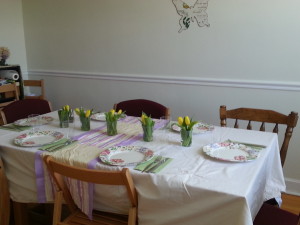At 15, I read in a home décor magazine that you were only supposed to fill things two-thirds full in order for it to look neat and orderly. So when I got my new bedroom at 16, a room I helped build on to the house, I intentionally left some of the walls and closet shelf space empty to try and create that feel.
Once the room was finished, I picked a blue-floral bedspread and curtains from the J.C. Penney catalog and took a pillowcase to Home Depot to have the color matched. I sponged the gray-blue paint onto the baseboard and molding before we nailed it to the walls.
I was trying to keep it all together, I think. Trying to make it right. I am the child of a parent with chronic mental and physical illnesses. As a child, that meant taking on the responsibility of taking care. I wanted things stable and orderly and, above all, correct.
For a few years before I moved to college my junior year, those empty spaces and coordinating color scheme were a retreat. The aesthetics calmed and centered me.
************
After landing a full-time job after college, I moved into my first all-my-own apartment. I dove into decorating it just the way I wanted. Things matched less, but they still coordinated. I bought sofas and curtains, lamps and end tables brand-new from the store. I wanted it decorated and soon. I bought fabric and made my own upholstered headboard and hunted down antique picture frames for the walls of my bedroom. I took a page from an interior design magazine and recreated a wall collage behind my dining room table.
When Christmas came, I bought new decorations that sparkled and shone in perfect complement to my décor.
It was common for me to lock myself in my apartment from the time I got home from work on Friday until I left for work on Monday. “Introvert re-charge,” I would say. And sometimes that is needed. But in truth, it was easier to just stay in, not interact with anyone, and piddle away on some new home décor project. I even started a short-lived blog full of recipes and decorating tips.
************
When I was 29, I moved into graduate on-campus housing, complete with an R.A. and roommates. The apartments were built in the 1930s and, aside from the random rules that come with campus housing, I rather enjoyed the cozy wood floors and the old bathroom mirror with the flower scroll etched across the glass.
Perhaps the thing I was most nervous about as I prepared to move to grad school was that my home would feel like a dorm. That I would feel like a kid. I was afraid of ugly furniture and plastic storage bins and cramped spaces. I was afraid it was all going to feel like a mess.
And things didn’t match—except for the industrial, boxy, bedroom furniture. My bedspread was black and white, my roommate’s was bright neon colors. The bathroom linen closet was stocked with a haphazard collection of multi-colored towels in various states of wear. The empty wall of the small galley kitchen was a jigsaw puzzle of mismatched shelves holding extra dishes and cookbooks and pantry staples. Every third of the bedroom walls were lined with furniture. Desk, dresser, bed, repeat. Shelves were stuffed full of textbooks and binders and picture frames of family and friends in other states. There was no money to spend on new, matching furniture. There was too little space for all of my things.
Yet, that apartment was home to one of my most well-lived years. There was nothing more satisfying than to find the sink full of mismatched coffee mugs, evidence of another night of friends studying together or talking.
On Sunday evenings, friends and neighbors gathered and we made dinner. One person would cook, filling the small sink of the small kitchen with pans and cutting boards and wooden spoons.Then we’d eat—mismatched chairs crowded around a table with mismatched glasses in front of matching plates, the thin blue and white Corelle dishes I had inherited from my grandmother.
As the year went on, dining together just became a habit, no matter the meal. We had a French toast feast as the snow piled deep outside. On the days it never stopped raining, there was a crock pot of soup ready and warm. We decided JFK’s Birthday needed celebrating, so we researched and recreated his favorite meal. One warm night, we picked up a few “gourmet” ingredients from the grocery store, put on a record of classical music, opened all the windows, and laughed and talked and ate as the cross breeze drifted through our impromptu dinner party in that mismatched, unrefined, no-color-palette home.
That year, we managed to live life together instead of just being roommates or neighbors. It happened with overcrowded shelves and walls and it never once felt like a mess.
**********




